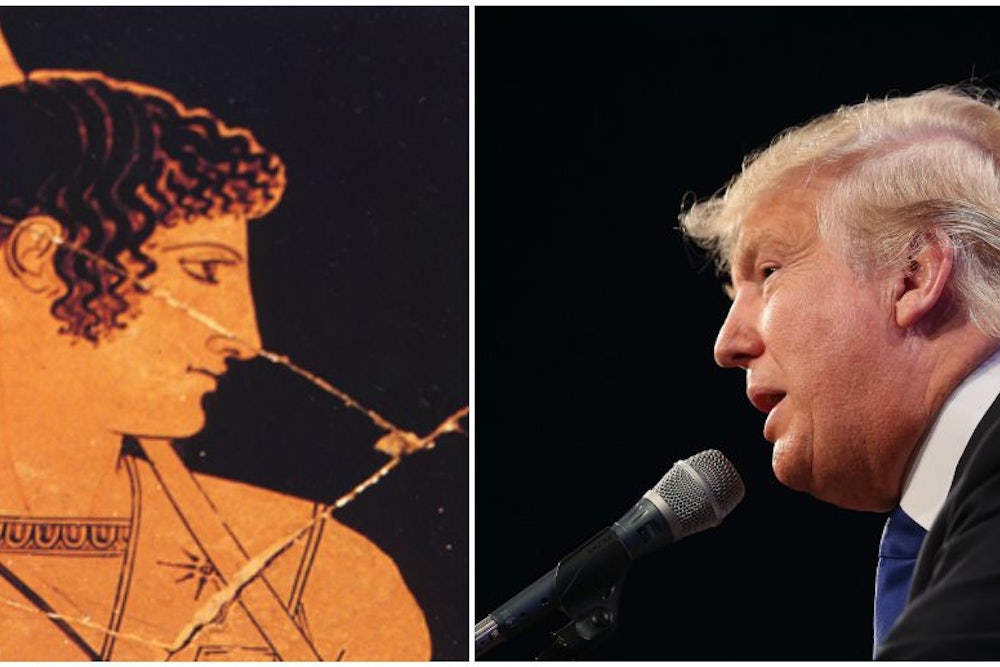Donald Trump is famous for his verbal flourishes, boasting about his accomplishments and insulting his rivals and critics. He has called Rand Paul “a spoiled brat without a properly functioning brain,” said that “if you listen to Carly Fiorina for more than ten minutes straight, you develop a massive headache," and, to those who dissed his show The Apprentice: “Losers and haters, even you, as low and dumb as you are, can learn from watching Apprentice and checking out my tweets-you can still succeed!”
When he’s not hurling invective at others, Trump can be heard preening on his own greatness, exulting over his intelligence, his wealth, and his way with women.
Sorry losers and haters, but my I.Q. is one of the highest -and you all know it! Please don't feel so stupid or insecure,it's not your fault
—
realdonaldtrump
Trump’s rhetorical braggadocio and spite might seem crude, even juvenile. But his special way with words has a noble ancestry: flyting, a recurring trope in epic poetry that eerily resembles the real estate magnate's habit of self-celebration and cruel mockery. Trump is, in a twisted way, an heir to the great heroes of antiquity: Gilgamesh, who slew the monstrous giant Hambaba; Achilles, whose name was terror to the Trojans; and David, whose slingshot was the death of Goliath.
As the towering Jesuit polymath Father Walter Ong noted in his seminal book Orality and Literacy (1982), “Bragging about one’s own prowess and/or verbal tongue-lashings of an opponent figure regularly in encounters between characters in narrative: in the Iliad, in Beowulf, throughout medieval European romance, in The Mwindo Epic and countless other African stories…, in the Bible, as between David and Goliath (1 Samuel 17:43–7). Standard in oral societies across the world, reciprocal name-calling has been fitted with a specific name in linguistics: flyting (or fliting).”
Flyting is a product of the inevitable fact that oral communications involve the face-to-face encounter between two or more individuals, and have a call-and-response structure. Spoken exchanges therefore have a bias towards the agonistic, with skill at boasting and insults being a marker of achievement. This stands in contrast with the “abstraction” promoted by printed texts, which we often read alone, therefore giving rise to cooler and more dispassionate rhetoric.
“Writing fosters abstractions that disengage knowledge from the arena where human beings struggle with one another,” Ong noted. “It separates the knower from the known. By keeping knowledge embedded in the human lifeworld, orality situates knowledge within a context of struggle."
Trump’s preferred medium of communication, Twitter, might seem far removed from the pre-technological world of the ancient heroes. Yet in the analytical schema developed by Ong, Twitter (and other social media) are best understood as a form of “secondary orality”—ways of communication that developed post-print and offer a partial return to orality. In particular, the ease of publicly volleying comments on Twitter brings us back to a world where protagonists hurled insults at each other in front of a large audience.
The heroes from the age of orality are similarly distinguished by the use heated, overcharged language. In 1 Samuel, David is recorded as telling Goliath, "I’ll strike you down and cut off your head. This very day I will give the carcasses of the Philistine army to the birds and the wild animals...” Or to translate it into the language of Donald Trump: Goliath is a total loser.
In the emotional climax of the Iliad, the Trojan hero Hector lies dying outside the city walls and begs his killer Achilles to let him return to his family so he can perish in peace. Achilles takes the moment to indulge in some Trumpian chest-thumping:
You’ll have no bed of death, nor will you be
Laid out and mourned by her who gave you birth.
Dogs and birds will have you, every scrap.
An obvious precursor to Trump’s paeans of self-love can be found in the bluster of Gilgamesh, who lists off his great achievements before he does them:
I will cut down the tree, I will kill Humbaba
I will make a lasting name for myself,
I will stamp my fame on men’s mind forever.
Flyting isn't just simple insults and boasts, but has a narrative purpose: It is a way to give meaning to combat. By proclaiming one’s greatness and the describing the baseness of the foe, the stakes of the battle are made clear, so that victory has a political meaning. And while the formulaic nature of Trump’s flyting—the recurring use of words like “loser” and “hater,” for example—might seem comic to some, it also has a narrative purpose: As Ong points out, repetition and formulaic phrases are crucial to orality, partially as memory tools but also to reinforce messages.
In his introduction to his translation of Gilgamesh, the poet Stephen Mitchell links the “desire for fame” and vocal “posturing” of the ancient hero with the boastings of Muhammad Ali, proving that “human nature hasn’t changed much from Gilgamesh.” Indeed, although the age of orality is long gone, oral traditions like flyting persist wherever there is agonistic combat, be it in the boxing ring or even the more scripted realm of professional wrestling (which is where Donald Trump likely learned his own style of flyting). Some scholars, such as the late historian Ferenc Szasz, have argued that hip-hop competitions and slam poetry are modern counterparts to flyting. Certainly the form still has a vibrant vernacular life. Trump’s innovation was to bring it to presidential politics.
